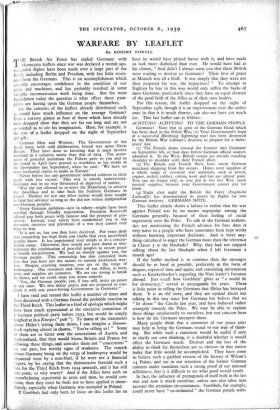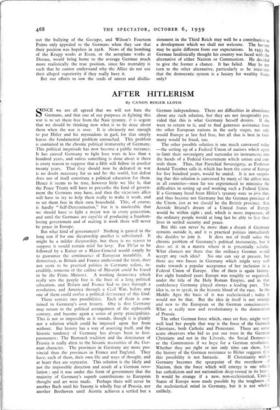WARFARE BY LEAFLET
By ROBERT POWELL
rr IIE British Air Force has raided Germany with 18,000,000 leaflets since war was declared a month ago. si—issful flights have been made over a large part of the Rc including Berlin and Potsdam, with but little resist- an,.. from the Germans. This is an accomplishment which certainly encourages confidence in the condition of our r1L is and machines, and has probably resulted in some va. :able reconnaissance work being done. But for most Enlishmen today the question is what effect these pam- phlets are having upon the German people themselves. Are the contents of the leaflets already distributed such as would have much influence on the average German? Even a cursory glance at four of those which have already been dropped show that they are far too long and are not so worded as to stir his imagination. Here, for example, is the text of a leaflet dropped on the night of September 3rd-4th: "German Men and Women: The Government of the Reich have, with cold deliberation, forced war upon Great Britain. They have done so knowing that it must involve mankind in a calamity worse than that of 1914. The assur- ances of peaceful intentions the Fairer gave to you and to the world in April have proved as worthless as his words at the Sportpalast last September, when he said : ' We have no more territorial claims to make in Europe.'
" Never before has any government ordered subjects to their death with less excuse. This war is utterly unnecessary. Germany was in no way threatened or deprived of justice.
" Was she not allowed to re-enter the Rhineland, to achieve the Anschluss and to take back the Sudeten Germans in peace? Neither we nor any other nation would have sought to limit her advance so long as she did not violate independent non-German peoples.
" Every German ambition—just to others—might have been satisfied through friendly negotiation. President Roosevelt offered you both peace with honour and the prospect of pro- sperity. Instead, your rulers have condemned you to the massacre, miseries and privations of a war they cannot ever hope to win. It is not us, but you they have deceived. For years their iron censorship has kept from you truths that even uncivilised peoples know. It has imprisoned your minds as in a concen- tration camp. Otherwise, they would not have dared to mis- represent the combination of peaceful peoples to secure peace as hostile encirclement. We had no enmity against you, the German people. This censorship has also concealed from you that you have not the means to sustain protracted war- fare. Despite crushing taxation, you are on the verge of bankruptcy. Our resources and those of our Allies, in men, arms and supplies are immense. We are too strong to break by blows, and we could wear you down entirely. " You, the German people, can, if you will, insist on peace at any time. We also desire peace, and are prepared to con- clude it with any peace-loving Government in Germany."
I have read and reread this leaflet a number of times and have discussed with a German friend the probable reaction in the Third Reich. This leaflet is a kind of apologia which might have been much appreciated at the executive committee of a German political party before 1933, but would be simply laughed at in a Kneipe (" pub "). To many of the statements about Hitler's letting them down, I can imagine a Stamm- Inch replying almost in chorus, " You're telling us! " Some of them are so bitter over the annexations of Austria and Sudetenland, that they would blame Britain and France for allowing these things, and consider them not " concessions " k.n our part, but merely signs of weakness. The remark about Germany being on the verge of bankruptcy would be answered even by a non-Nazi, if he were not a financial expert, by his saying that the democracies foretold such a fate for the Third Reich from 1934 onwards, and it has still not come, so why worry? And if the Allies have such an overwhelming superiority in arms and men, he would con- tinue, then they must be fools not to have applied it imme- diately, especially when Germany was occupied in Poland.
If Goebbels had only been let loose on this leaflet for an hour he would have played havoc with it, and have made us look more diabolical than ever. He would have had as his climax, " And didn't I always warn you that these British were waiting to destroy us Germans? Their love of peace at Munich was all a bluff. It was simply that they were not then prepared for war, the hypocrites! " To attempt to frighten by fear in this way would only stiffen the backs of most Germans, particularly since they have an equal distrust of the good faith of the Allies as of their own leaders.
For this reason, the leaflet dropped on the night of September 24th, though it is an improvement over the earlier ones in that it is much shorter, can also not have cut much ice. This last leaflet ran as follows: ACHTUNG! ACHTUNG! TO THE GERMAN PEOPLE. Germans! Note that in spite of the German blood which has been shed in the Polish War, (1) Your Government's hope of a successful Blitzkrieg (lightning war) has been destroyed by the British War Cabinet's decision to prepare for a three- years' war.
(z) The French Army crossed the frontier into Germany on September 6th, or four days before German official sources admitted it. In the West, British troops are already standing shoulder to shoulder with their French allies.
(3) The British and French fleets have swept German merchant shipping from the oceans. Hence your supplies of a whole range of essential war materials, such as petrol, copper, nickel; rubber, cotton, wool and fats are almost gone. You can no longer rely, as you did in the last War, upon neutral supplies, because your Government cannot pay for them.
(4) Night after night the British Air Force (Englische Luftwaffe) has demonstrated its power by flights far into German territory. GERMANS NOTE.
This leaflet clearly shows a failure to realise that the war against Poland was by no means unpopular among the Germans generally, because of their feeling of racial superiority over the Poles. To talk of the German authori- ties not mentioning the French advance for four days is very naive to a people who have sometimes been kept weeks without knowing important decisions. And is there any- thing calculated to anger the German more than the reference in Clause 3 to the blockade? Why, they had not stopped talking about the last blockade when I left Germany a month ago!
If the leaflet method is to continue then the messages should be as brief as possible, preferably in the form of slogans, repeated time and again, and containing information such as Knickerbocker's regarding the Nazi leader's fortunes abroad. Just recall how Goebbels' gibes at " a world fit for democracy," served as propaganda for years. There is little point in telling the Germans that Hitler has betrayed them. It is an old story, and they are cynical about our talking in this way since few Germans but believe that we " let down " the Czechs last year, and have behaved rather strangely towards the Poles. We may be able to explain these things satisfactorily to ourselves, but our concern here is how do the Germans interpret them.
Many people think that a statement of our peace aims may help to bring the Germans round to our way of think- ing. But while such a statement would be useful if only to clarify our own thinking, it is doubtful whether it would effect the Germans much. Distrust and the loss of the ability to think for themselves are so obvious in that nation today that little would be accomplished. They have come to believe such a garbled version of the history of Wilson's 14 Points, and see in our retention of the former German colonies under mandates such a strong proof of our national selfishness, that it is difficult to see what good would result.
In fact, the influence of propaganda of itself both in the last war and now is much overdone, unless one also takes into account the attendant circumstances. Goebbels, for example, could never have " co-ordinated " the German people with- out the bullying of the Gestapo, and Wilson's Fourteen Points only appealed to the Germans when they saw that their position was hopeless in x918. News of the bombing of the Krupp works at Essen, or the aeroplane works at Dessau, would bring home to the average German much more realistically the true position, since his mentality is such that he cannot understand why the Allies do not use their alleged superiority if they really have it.
But our efforts to sow the seeds of unrest and disillu- sionment in the Third Reich may well be a contribution to a development which we shall not welcome. The harvest may be quite different from our expectations. In 1933 the German fatalistically thought his country was faced with the alternative of either Nazism or Communism. He decided to give the former a chance. It has failed. May he not turn to the other alternative, particularly as he maintains that the democratic system is a luxury for wealthy States only?



































 Previous page
Previous page